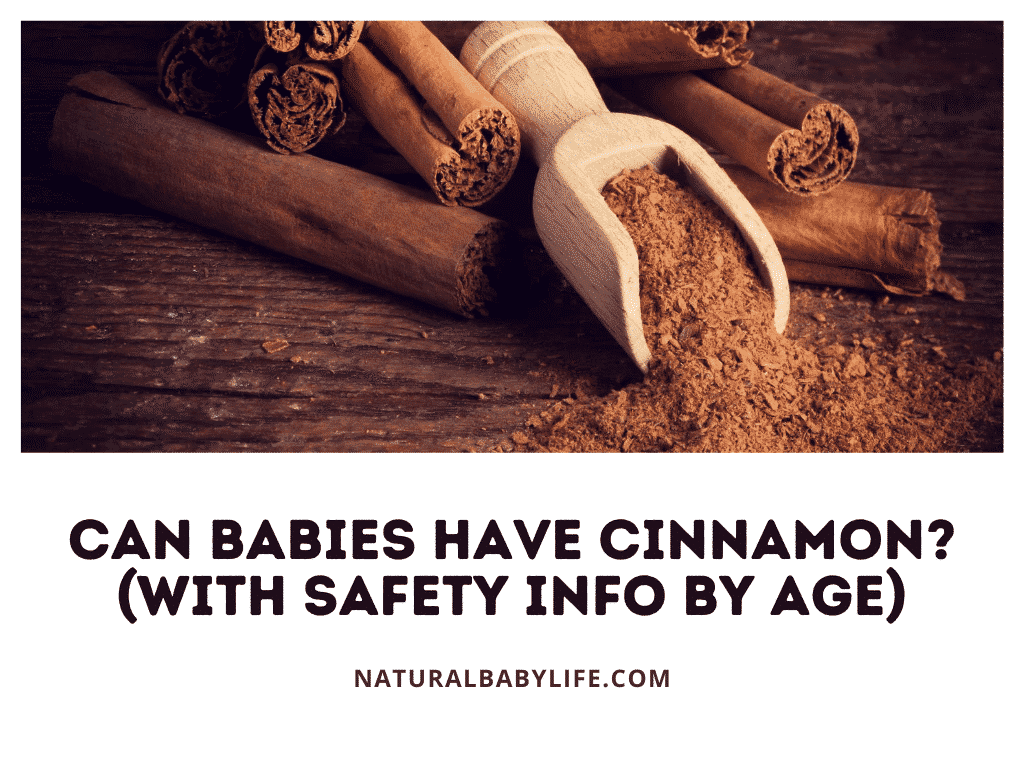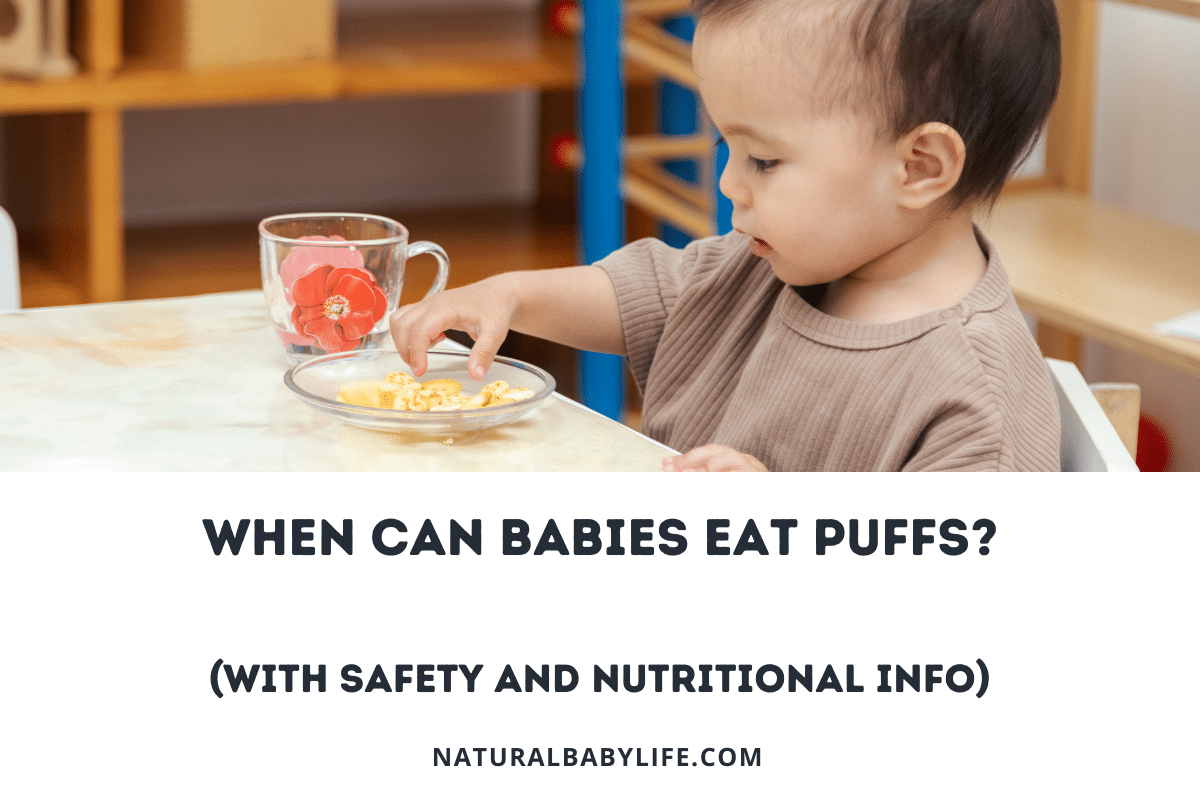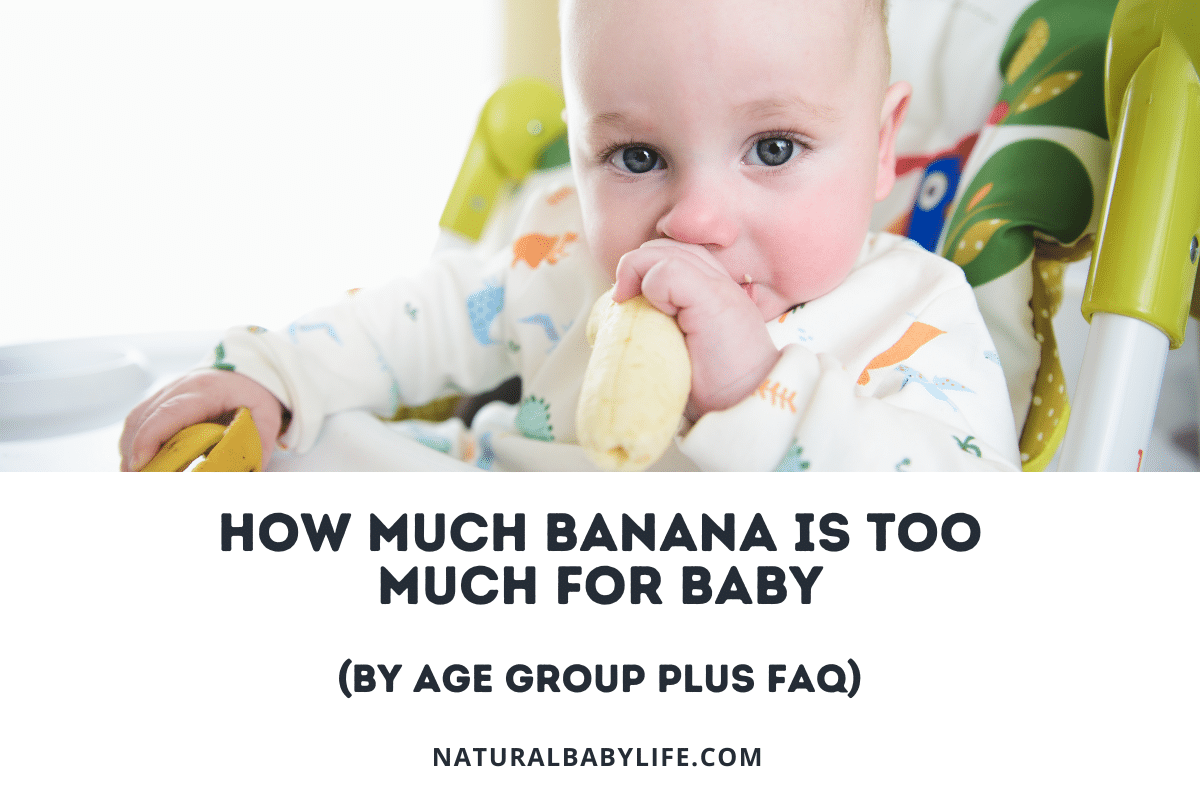Cinnamon is one of the world’s oldest and most popular spices and was, at a time, as precious as gold. With its spicy sweetness and powerful health benefits, even babies can’t seem to get enough.
Babies can have cinnamon around the age of 6 months when they start experimenting with solid foods. Since cinnamon isn’t a common allergen for babies, you can let your baby taste it by sprinkling a little on applesauce or other fruit purees and the monitor for any potential digestive upset or intolerance.
Since ancient times, cinnamon has been seen as a strong immune booster inside and out. Let’s delve into more reading to see the effects of this “wonder spice”.
Table of Contents
Is cinnamon safe for babies to eat?
Cinnamon is generally considered to be safe when consumed in small quantities in a variety of foods.
Most parents will start to introduce cinnamon and other spices into the diet of their babies as young as 6 months old and, as long as there is no allergic reaction detected, it is safe to use small amounts (less than half a teaspoon) per day in baby food.
There is a debate on whether different types of cinnamon are safer for children than others. The two main types are Ceylon and Cassia. Each is a different type of the same spice and holds different properties.
Ceylon originates from Sri Lanka as far back as 2000 BC and was imported by the ancient Egyptians in the use of embalming mummies. In medieval times, doctors used cinnamon to treat hoarseness, arthritis, sore throat, and general coughing. It could also be used for curing meats because of its antimicrobial properties.
Cassia originates from southern China. It is cheaper and a rougher texture than Ceylon and is used more often around the world in foods.
Can babies be allergic to cinnamon?
We’ve mentioned already that cinnamon isn’t a common allergen, but that doesn’t mean it can’t happen.
According to recent studies, spice allergies (as a whole) only make up 2 percent of all allergies so it is very unlikely that your baby will have much to worry about. With that said, it is always important to only give small quantities of any new food to babies and monitor them for any potential warning signs.
With that said – let’s get into those potential issues!
What are the side effects of cinnamon?
Along with the benefits, there can be some side effects from consuming too much cinnamon.
Cassia cinnamon is said to have larger amounts of coumarin, which is a blood thinner. This can lead to liver damage if too much is consumed. Ceylon or “true” cinnamon contains little to none of the coumarin.
However, it would take a lot of cinnamon consumption to cause side effects so normal additions to food should not cause any issues.
Other side effects can develop from the outside or the inside:
- Can cinnamon cause diarrhea in babies? Yes, they can get an upset stomach and/or diarrhea from sensitivity or too much consumption
- Baby gets a rash after eating cinnamon, which can appear on the skin and around the mouth. Washing with soap or water is the best way to clear it. If it lingers or gets worse, hydrocortisone cream is recommended.
- Baby has a red face after eating cinnamon and usually happens around the mouth.
What are the potential allergies associated with cinnamon?
Allergies from cinnamon, though rare, can occur especially if there is a compromised immune system or history of allergies in the family history:
- Skin symptoms can include:
- Tingling or Itchy skin on body or mouth
- Hives (large red blotches)
- Rash, blisters, eczema
- General redness and irritation
- Gastrointestinal symptoms:
- Diarrhea
- Vomiting
- Stomach cramps
- Cold mimicking symptoms:
- Coughing
- Wheezing or shortness of breath
- Itchy throat and tongue
- Runny or congested nose
- Soreness, Red and itchy eyes
- Rare cases of anaphylaxis can occur. If one or more of these takes place, it is best to contact emergency personnel as soon as possible:
- Swollen lips, tongue, and throat, which can block the airways
- Tightened airways causing coughing, wheezing, and shortness of breath
- dizziness/lightheadedness
- Vomiting/ stomach cramps
- Hives
- Drop in blood pressure
- Loss of consciousness
- Rapid heart rate
Discussing any concerns about allergies with your doctor is important especially with babies because they cannot communicate their issues. If your child is allergic to cinnamon, you have to be very careful to read all labels of food. It can also be found in a lot of other places that you might not suspect such as shampoo, toothpaste, chewing gum, etc. Also, women who are pregnant with a high-risk pregnancy or high risk of miscarriage should avoid cinnamon, as it could be a danger for baby and mother.
Never, ever give cinnamon in its powder form to a baby or child by itself. There was a YouTube challenge a couple of years ago where people would eat a spoonful of cinnamon. Eating cinnamon in this way can cause choking and even death in certain situations.
Side effects can include:
- Cause airway problems such as suffocation, coughing, and wheezing
- Severe skin irritation such as rash or itchiness
- Rashes around the mouth and throat
When can babies have cinnamon?
Some studies have suggested that babies can react to certain flavors and spices as early as through the amniotic fluid in the womb. This creates a “blueprint” of what the baby will probably enjoy in life as they grow.
Doctors recommend waiting until the baby is at least 6 months old before trying any spices. The aromatic ones, including cinnamon, are the first suggested. In small quantities, it can be added to just about any food your baby loves to eat to enhance their taste buds.
Different cultures also use cinnamon and other aromatic spices to give to their children.
How much cinnamon to add to baby food
Generally, less is more. Babies don’t need a lot of spices in their food, just a taste to get their tongues and minds going. A sprinkle is all you need to add flavor. Some premade baby foods already contain cinnamon as a sweet enhancer ingredient.
As a general rule, babies should have less than half a teaspoon of cinnamon per day.
Can babies have cinnamon applesauce?
We’ve discussed adding cinnamon to a baby’s food but what about ready-made applesauce that contains cinnamon?
Cinnamon applesauce is a way to let your baby taste cinnamon for the first time because there is likely a very small amount inside commercially processed applesauce.
If your baby loves it, consider making your own!
Can babies have cinnamon in oatmeal?
Cinnamon is a delicious addition to oatmeal, making it warm and healthy. Along with jam, peanut butter, or fruit, it can be the perfect morning food.
Other foods that are good with cinnamon for babies:
- Apple sauce
- Yogurt
- Baked goods (cookies, cake, bread, etc.)
- Mashed pumpkin, various squashes, or sweet potatoes
- Rice, rice pudding, or quinoa
- Any homemade fruit combo or baby food concoction
- Toast with butter
- Some chicken dishes work well with cinnamon as well
Indian recipes:
- Chicken Biryani
- Carrot and Pea Curry
Mexican Recipes:
- Horchata (rice milk with cinnamon)
- Rice with apples and cinnamon
- Cinnamon tea (for toddlers)- boil a cinnamon stick for 5 minutes and add sweetener
Chinese Recipes:
- Almond cookies
- Rice pudding
Can you put cinnamon in baby formula?
Yes, it is possible to put cinnamon in baby formula. The bigger question is really should you add it to the formula in the first place.
Babies that are still younger than 6 months and haven’t begun experimenting with solid foods shouldn’t use cinnamon in their formula. On the other hand, once your baby is experimenting with solid foods then you can start to think about transitioning your baby away from formula and instead focus on making the solid foods taste better for your baby.
It can also, milk, almond milk, or any other milk alternatives, although, it would be best to check with the pediatrician if you are unsure.
Potential benefits of cinnamon for babies and toddlers
There are many reported benefits of eating cinnamon, regardless of your age. However, many of these benefits are fairly anecdotal and don’t have robust medical studies backing them up.
Still, anecdotes are often true in many ways and it might be better to assume that some of the more incredible claims might not be true but cinnamon is still a tasty and overall healthy spice to use when cooking for both you and your baby!
By the way, benefits can start as early as in the womb from the mother consuming cinnamon. Eating it has been shown to regulate the blood pressure in pregnant women, reducing the risk of preeclampsia which can be a dangerous condition for mother and baby. Breastfeeding also gives multiple nutrients to the baby because of everything consumed through the breastmilk. It is said to increase the milk supply and blood flow.
Cinnamon is a powerhouse of health and offers children a variety of immune-boosting benefits:
- Inflammation and antioxidation – It’s generally considered that eating foods rich in anti-inflammation and anti-oxidation properties is good for overall health, longevity, and even the relief of pain caused by inflammation. In fact, these properties could even help ease the symptoms of conditions such as asthma and healing wounds more quickly. Some studies also point to this anti-inflammatory property helping ease the symptoms of multiple sclerosis.
- Immune system – Cinnamon is reported to help boost resistance to allergies and generally improve the immune system‘s ability to resist antigens and certain fungal infections.
- Digestion – It can help protect the stomach lining against bad gut bacteria and overactive stomach acid. But, too much can be a bad thing and lead to diarrhea and other stomach upset.
- Blood sugar – There is some evidence that shows cinnamon helps with the body’s ability to control blood sugar which could reduce the likelihood of developing type 2 diabetes.
- Promotes blood flow – Some elements of cinnamon work as mild blood thinners which can help regulate blood pressure, reduce the likelihood of heart disease, and other heart issues.
- Metabolism – Some studies point to cinnamon’s ability to regulate the body’s metabolism and reduce the body’s reaction to high-fat meals.
A study says that eating cinnamon helps regulate blood sugar which will help fight off the onset of Type 2 Diabetes in people who have the stages of prediabetes. There are statistics that show how Diabetes can increase the complications of the illness. Adding more cinnamon to your child’s diet, along with sanitization and social distancing, can be another fighter against modern health complications.
Using cinnamon for teething babies
The theory is that the spicy flavor and the anti-inflammatory properties of cinnamon soothe the baby’s gums.
Some parents even report giving their children the solid sticks to chew on, which are fairly strong and don’t break off easily. The soothing taste and feel seems to calm the babies down and offer comfort. Cinnamon water has also been used in some cases as well. However, never leave the child unsupervised as with any other food.
Cinnamon is healthy and adds some spicy adventure to food. Used for thousands of years, this cinnamon is a continuing superfood. This is in no way a clinical study. Always check with your doctor before introducing a new food to your child. Moderation is best and there are many delicious recipes with cinnamon for your little one to try.
Remember, while the benefits are many, too much of any food can be a bad thing, especially with children. Any allergies or concerns should be discussed with your pediatrician.










